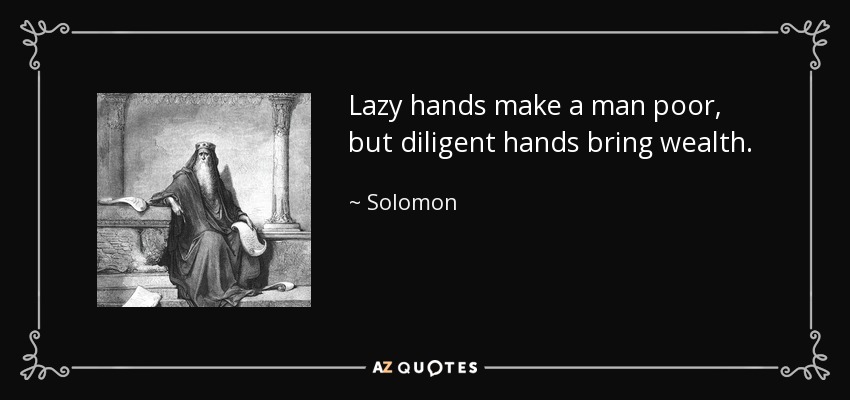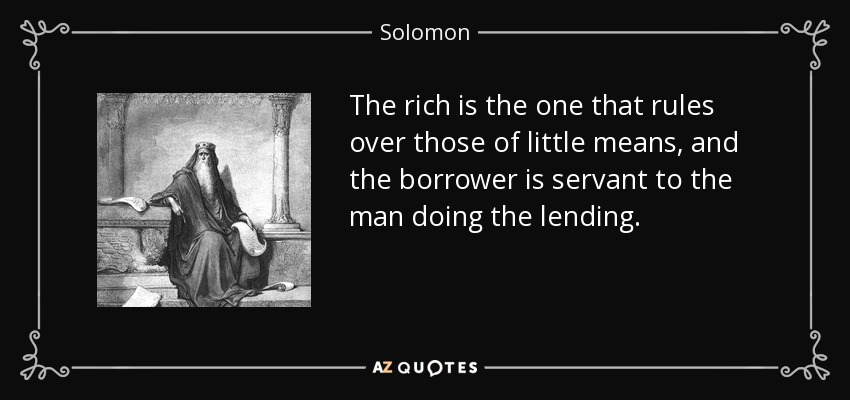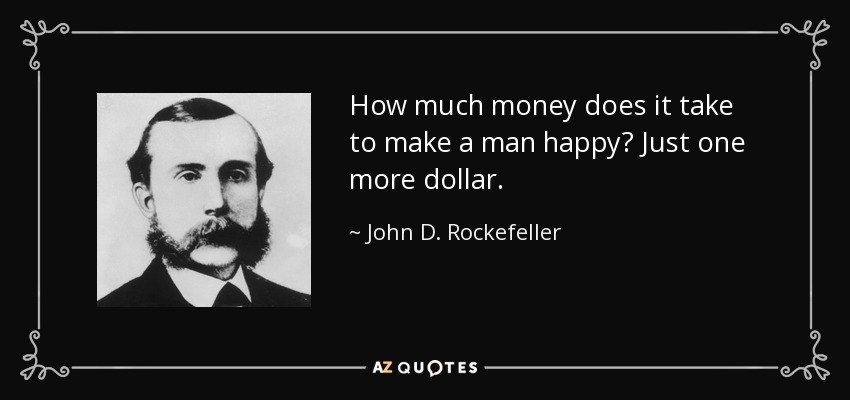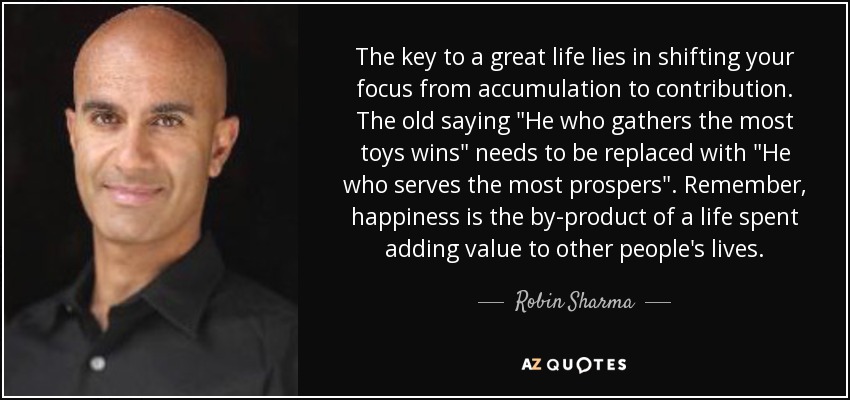Click here to return to Blog Post Intro
Your Priorities
Solomon acknowledges that material wealth has benefits, but he is quick to point out that certain things have a higher priority. Consider the contrasts Solomon offers:
| Proverbs | Better Is… | Than… |
| 15:16 | Having Little + Fear of God | Great Wealth + Turmoil |
| 15:17 | Few Vegetables + Love | Fattened Calf + Hatred |
| 16:8 | Little + Righteousness | Much + Injustice |
| 17:1 | Dry Crust + Peace & Quiet | Feast + Strife |
| 28:6 | Poor + Blameless | Rich + Perverse |
The Road to Poverty
Consider the insights Solomon offers on why some people end up in poverty:
- Proverbs 14:23 – Merely talking instead of working hard
- Proverbs 20:13 – Loving sleep
- Proverbs 21:5 – Making haste instead of planning diligently
- Proverbs 21:17 – Loving pleasure
- Proverbs 23:21 – Becoming drunkards & gluttons
- Proverbs 28:19 – Chasing fantasies instead of working the land
At the turn of this century, over half of the households in America had credit card debt. Today, that number is down to 41%. The average American household debt is $5,700, and households with the lowest net worth (zero or negative) hold an average of more than $10,000 in credit card debt.
Solomon points out that the borrower is a slave to the lender. He also says that cosigning on someone else’s loan is sheer madness (check out Proverbs 6:1-5). If you can’t afford to lend money to a friend and never see a penny back, then you can’t afford to cosign his loan (since you are promising to pay in the very real possibility that he won’t). You are also risking losing your friend as well as your property.
On Prosperity
Proverbs 10:22 says, “The blessing of the Lord brings wealth, without painful toil for it.”
The Hebrew adds an emphatic pronoun: “The blessing of the Lord—it makes one rich.” The implication is that nothing but God’s blessing makes one truly rich.
Prosperity theology teaches that “whom the Lord loveth, the Lord maketh rich.” Does God want all Christians to be rich?
Consider these Proverbs:
- Lazy hands make for poverty, but diligent hands bring wealth (10:4).
- Dishonest money dwindles away, but whoever gathers money little by little makes it grow (13:11).
What does that say for “get rich quick” schemes? Frankly, those are not Biblical…nor is “winning the lottery.”
Wealth has its privileges…and those privileges bring responsibility…
According to Proverbs 14:31, “Whoever is kind to the needy honors God.” Proverbs 21:13 warns, “Whoever shuts their ears to the cry of the poor will also cry out and not be answered.” Similarly Proverbs 28:27 says, “Those who give to the poor will lack nothing, but those who close their eyes to them will receive many curses.”
Pioneering American philanthropist Andrew Carnegie agreed. He once set the standard for giving back, observing, “No man can become rich without himself enriching others. The man who dies rich dies disgraced.”
We can’t just ignore the plight of the poor. If we use our resources to help them, we will “have plenty.”
What about “Work-Life Balance”?
Proverbs 23:4 warns, “Do not wear yourself out to get rich.”
Jesus taught the crowd a similar lesson (Luke 12:15-21) when He said, “Watch out! Be on your guard against all kinds of greed; life does not consist in an abundance of possessions.” And he told them this parable: “The ground of a certain rich man yielded an abundant harvest. He thought to himself, ‘What shall I do? I have no place to store my crops.’ Then he said, ‘This is what I’ll do. I will tear down my barns and build bigger ones, and there I will store my surplus grain. And I’ll say to myself, ‘You have plenty of grain laid up for many years. Take life easy; eat, drink and be merry.”’
“But God said to him, ‘You fool! This very night your life will be demanded from you. Then who will get what you have prepared for yourself?’ This is how it will be with whoever stores up things for themselves but is not rich toward God.”
Solomon would beg to differ with that old saying, “He who gathers the most toys wins.” In Proverbs 11:4, he reflects, “Wealth is worthless in the day of wrath, but righteousness delivers from death.”
Conclusion
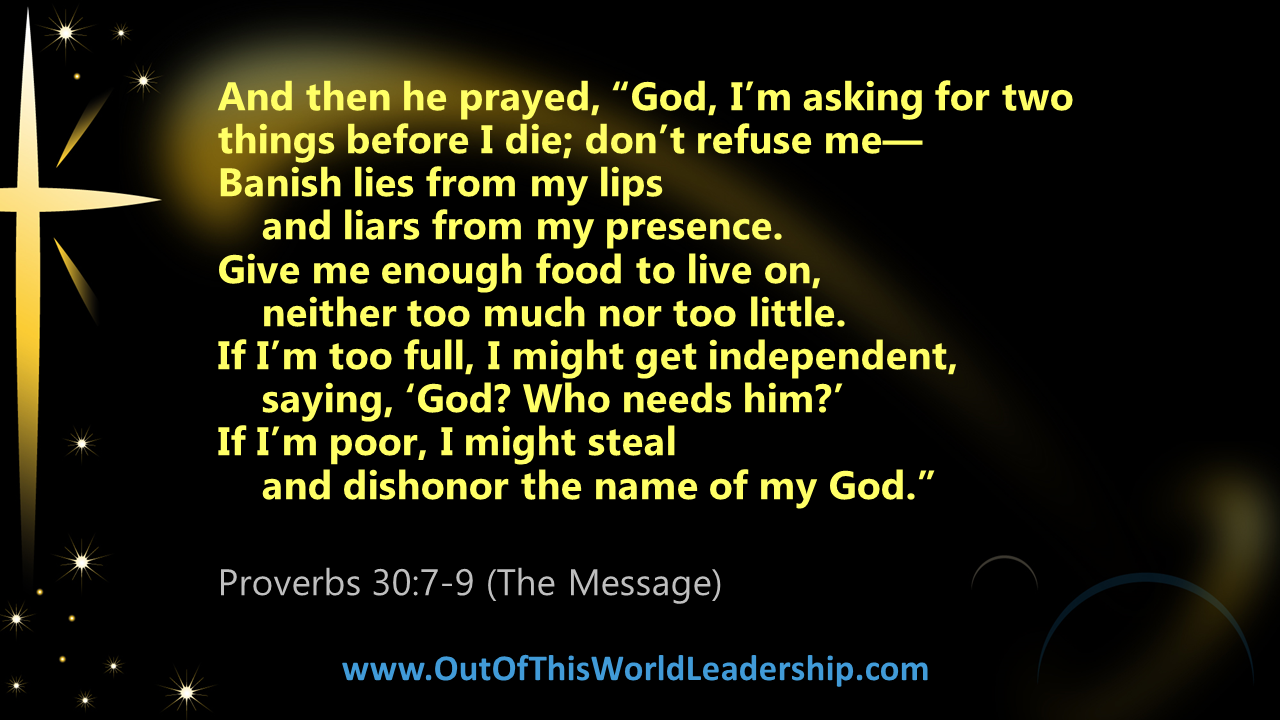
The wise person seeks, among other things, to avoid extremes because they often present moral dangers. Pray, as the wise person does, to avoid extremes of poverty and wealth, so that neither will lead you into temptation.
As you shoot for the stars, embrace the attitude found in this petition of the Lord’s Prayer, “Give me only my daily bread”!


